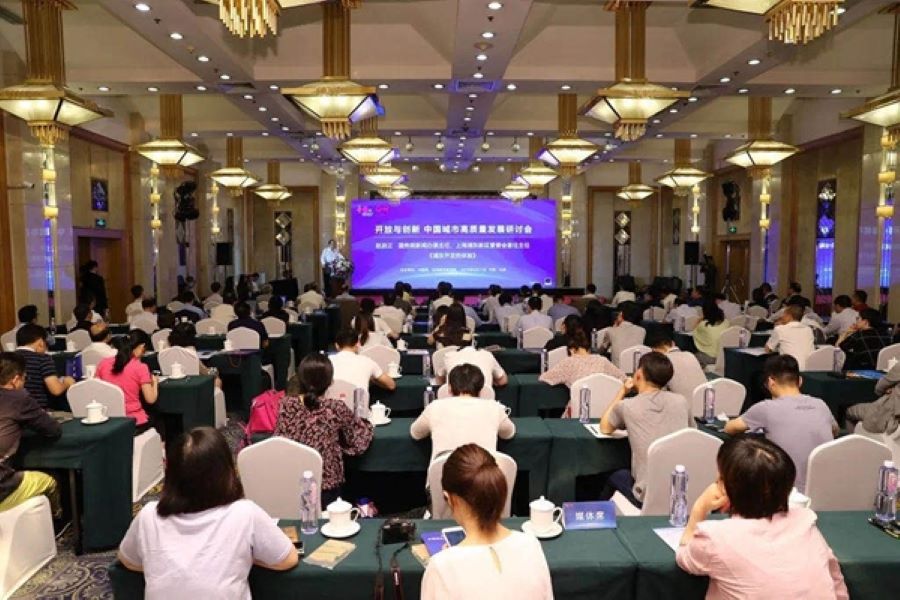Pudong: A metropolis designed beside a globe


In terms of land use, we also had our own ideas. When Pudong New Area was established, it only covered 6 million square meters, now it has more than 20 million after several expansions. It is pretty large now, but still not enough. But back then, leasing land, particularly to foreigners, was forbidden, it was even against the Constitution. Having no way to go, we came up with the idea of "land-use rights," so we were just leasing the right to use the land, instead of the land itself. It was not easy to get things done, but we made it. By now, the Constitution has long been amended regarding land-use rights.
We also proposed the idea of "cherishing the land as gold." In Pudong, the land lease is not measured by mu (one mu is equivalent to 0.0667 hectares), but by square meters, and each building is leased according to its floor area. Shanghai is the earliest and probably the only one in China to raise this idea and we even asked calligraphers to write this slogan and had it pasted on the wall to remind ourselves. When some high-ranking officials from Beijing came and saw the slogan, they asked, "What do you mean by this? The land is very expensive?" Our answer is always yes. Not only is the land very expensive, we would also evaluate how land lessees utilize the land, as well as their investment density.
Back then there was a saying in China, "you build up a stage with culture and arts, and then on the stage you can develop economy." It basically conveyed the idea that in order to attract foreigners, you should develop literature and arts first, through holding art shows, film exhibitions, kite festivals, etc. In Pudong, we didn't do any of that, because we knew that meant two types of people. You want intellectuals and artists, fine, but they don't do investments. And for entrepreneurs or economists, theatres are not the reason that they would come to your place. In all, we do not agree with the saying.
We also had different views on the once prevailing practices of "building nests to attract the phoenix." In some places, development zones had been established, but no one came. Then what? They built houses, believing that as long as the houses were ready there would be investment. I talked many times with my Japanese friends about this, and they had assured me that the hypothesis was wrong. Their belief was, if you want to build a hotel, you have to consult the future hotel operator at the beginning stage, and that was how MORI Building and other famous Japanese companies did. I agreed with them, so I did not "build nests to attract the phoenix." Wait until the phoenix comes, then you build nests.
In the 1990s, many pop stars were invited from Hong Kong and Macao to perform in inland counties. After their performance, local officials would literally give them some land as a reward or a gift. That was hilarious and wrong, in Pudong we never did things like that.
I was in charge of the land lease. Land prices varied, mostly based on locations. One square meter could cost up to $300 for a good location, while for a bad one it may only need $20 to $50. We wrote down rental prices on the map and examined closely to make sure that prices were reasonable. If we noticed a $100 among many $300s, there must be a problem. We needed to avoid cheap leasing. You see, it was not easy to "cherish the soil as gold."
Today we always talk about "don't forget the original aspirations." For Pudong, our original aspiration was to build a prosperous new urban area and a central city in the Asia-Pacific region. And most importantly, we must have integrity and work in the interest of the public. To achieve that target, we laid down several stipulations. The first one is to use first-class Party building to promote first-class development; the second is to develop good habits of diligence and honesty; and the third, we forbid major leaders of Pudong, including myself, from attending any land leasing meetings or auctions, and we were not allowed to take special care of our former subordinates or friends when it came to house relocation.
The ideas for the development of Pudong mentioned above have proved successful. Today, Pudong has encountered new challenges, such as lack of land, and high wages. It's a pity that I did not read the research reports of Cloud River Urban Research Institute until recently. It could have been of great use back then. We can never change the past, but we can summarize experience whether in success or failures in the past. That's how we create our times. I hope today, those research reports can avail today's mayors and play an important role in urban construction.




































